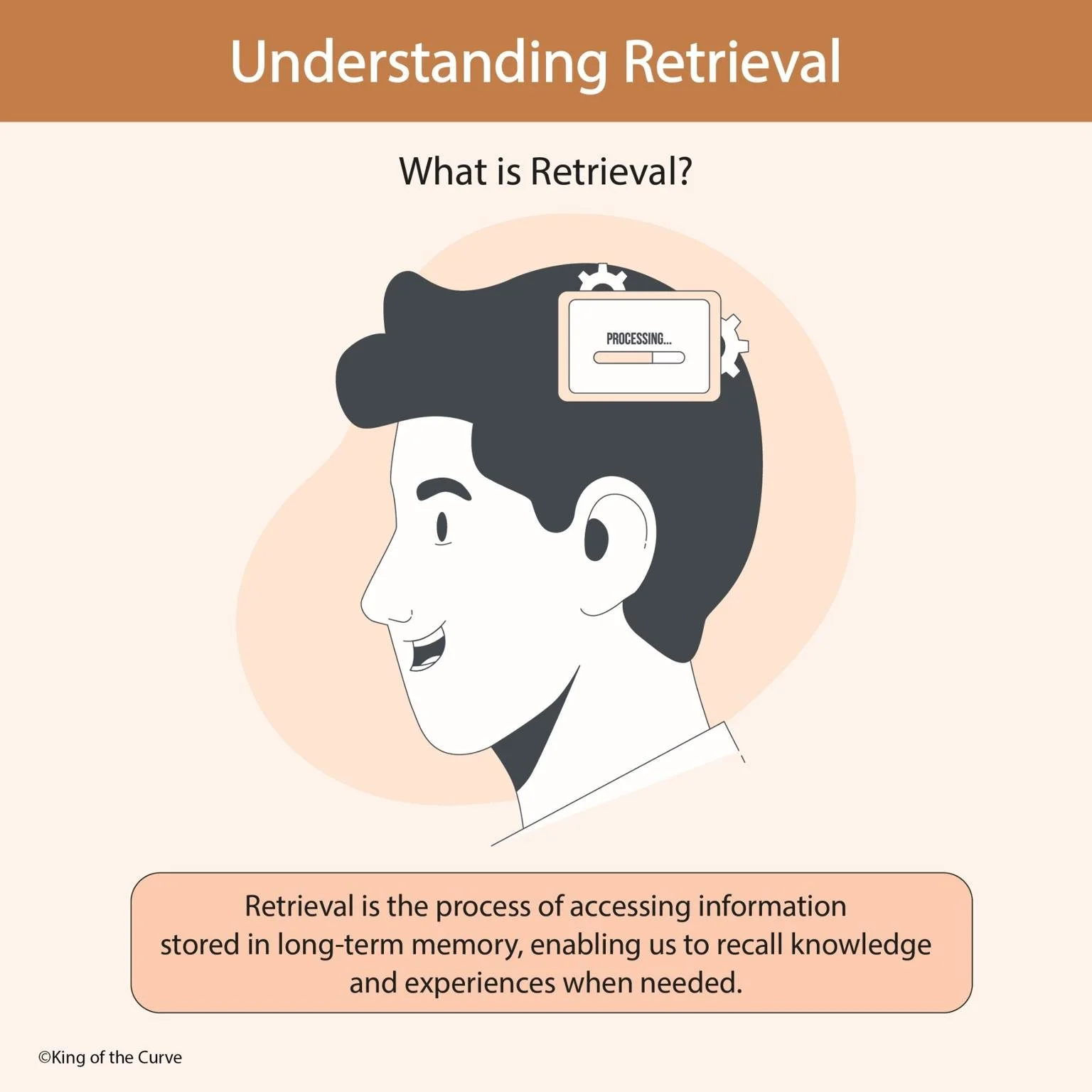🧠 Understanding Retrieval: Unlocking the Vault of Memory
Retrieval is the cognitive process through which stored information in the long-term memory is brought into conscious awareness. It allows us to recall previously encoded and stored data so we can use it in real-world scenarios—like taking exams, solving clinical cases, or recognizing familiar faces.
It is the final step in the memory process:
Encoding – Information is learned and transformed into a memory trace.
Storage – Memory is maintained over time.
Retrieval – Stored memory is accessed and used.
🔍 Types of Retrieval
| Retrieval Type | Description | MCAT-style Example |
|---|---|---|
| Recall | Retrieving information without external cues | Free-response question on glycolysis steps |
| Recognition | Identifying the correct info among options | Choosing the right neurotransmitter in a multiple-choice question |
| Relearning | Reacquiring knowledge more efficiently upon review | Revisiting biochemistry flashcards for the second time and recalling faster |
🧠 Fun Fact: Relearning reflects the savings effect—a memory trace was there, just dormant!
🧪 Why Retrieval Matters in Exam Prep
MCAT Scenario: You encounter a passage on stress and the hypothalamic-pituitary-adrenal axis. To answer correctly, you must retrieve specific info about hormone cascades and stress physiology.
This demonstrates the demanding nature of retrieval in high-stakes testing: you're not just recognizing facts—you’re applying them under time pressure and cognitive load.
Poor retrieval = blank stares at the question stem.
Strong retrieval = confident application of memorized content.
🛠️ Cognitive Psychology Insight
Retrieval is not just a memory tool—it’s a learning tool. When you practice pulling information from memory (like via active recall), you’re strengthening neural pathways, making the info easier to retrieve next time.
According to retrieval-based learning theory, the more effortful the recall, the more durable the memory becomes.
🎯 Techniques to Improve Retrieval
Here are science-backed methods to supercharge your retrieval abilities:
Spaced Repetition: Review information over increasing intervals (used in Anki).
Active Recall: Quiz yourself before checking notes or books.
Elaborative Interrogation: Ask “why?” to connect concepts.
Interleaving Practice: Mix related topics (e.g., endocrine + nervous systems).
Teach What You Learn: Explaining concepts reinforces recall and exposes gaps.
📌 Summary: Memory Retrieval at a Glance
| Concept | Key Takeaway |
|---|---|
| Retrieval | Accessing stored info in long-term memory |
| Why It Matters | Crucial for exams, clinical reasoning, and learning |
| Best Strategies | Active recall, spaced repetition, MCAT-style Qbanks |
🧬 Final Thoughts
Retrieval is like unlocking the vault of your mind. You may have memorized the facts, but if you can’t access them when it matters, it’s like they were never there. Strengthening retrieval through deliberate practice and testing is what separates passive learners from high-performing test-takers.
Whether you’re aiming for a top MCAT score or solid clinical retention, mastering retrieval is non-negotiable.
Frequently Asked Questions (FAQs)
-
Aim for 4-6 focused hours, ensuring you incorporate breaks to avoid burnout.
-
Practice mindfulness techniques, take practice exams under realistic conditions, and maintain a balanced lifestyle.
-
Set short-term goals, seek support from mentors, and reward yourself for small achievements.
-
Regular exercise improves focus, reduces stress, and enhances overall mental clarity.
-
KOTC offers personalized learning tools, gamification features, and adaptive question banks to help students stay on track without burnout.


